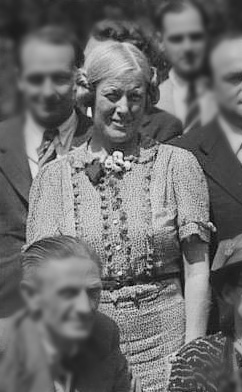Turbulent Londoners is a series of posts about radical individuals in London’s history who contributed to the city’s contentious past. My definition of ‘Londoner’ is quite loose, anyone who has played a role in protest in the city can be included. Any suggestions for future Turbulent Londoners posts are very welcome. Next up is Muriel Lester, a social reformer and pacifist.

Muriel Lester was a social reformer, pacifist, feminist and non-conformist. Like Charlotte Despard, she turned away from her privileged life, dedicating herself to helping the poor and advocating peace. Born in Leytonstone on the 8th of February 1883 to a wealthy Baptist family, by the time of her death aged 83 she had travelled the world, founded a social centre that still exists today, and been nominated for the Nobel Peace Prize. Twice.
Muriel moved to Bow in East London with her sister Doris in 1908. At the start of the twentieth century the East End was crowded and very poor. Many middle- and upper-class humanitarians were embarking on charitable projects in the area around this time, such as the lesser-known Pankhurst daughter Sylvia. In 1915, with money from their father, the Lester sisters bought a disused chapel and opened it as a ‘teetotal pub’, so that local people could have a place to meet in the evenings. They named it Kingsley Hall, after their brother who had died the previous year.
Between 1922 and 1926 Muriel was an Alderman on the radical Poplar Borough Council, and she chaired the Maternal and Child Welfare Committee. In 1928 a new purpose-built Kingsley Hall was designed as a community centre and place of worship. Muriel herself took on the role of vicar. Her spirituality was an important part of her campaigning throughout her life. In 1929 Muriel and Doris set up a second Kingsley Hall in Dagenham, where many Bow residents had been relocated after huge slum clearance programmes in the East End. Both Halls are still going strong today.

But community work in the East End was not the only way in which Muriel tried to make the world a better place. She was also a dedicated pacifist, and in 1914 was a founding member of the Fellowship of Reconciliation (FoR), a Christian Pacifist organisation which is also still active today. In 1926 she travelled to India and met Gandhi, with whom she developed a strong friendship. When he travelled to London for a conference in 1931, he stayed at the Kingsley Hall in Bow.
In 1934, Muriel began working as a secretary for the International FoR. She travelled the world spreading the message of non-violence. During a trip to Japan she was dubbed the ‘Mother of World Peace’, and she was detained in Trinidad in 1941 because of the success of her pacifist speeches in the US.
Muriel Lester was a woman who never stopped trying to help people. This mission continued even in death, as her body was donated to science. She used her privilege to benefit others, and demonstrated incredible bravery by taking the unpopular and frequently dangerous position of pacifist during two world wars. I make a point of featuring admirable women in the Turbulent Londoners series, and Muriel Lester would certainly make a good role model for any young woman.
Sources and Further Reading
Anon. “Lester, Muriel.” Bishopsgate Institute. No date, accessed 13th June 2015. http://www.bishopsgate.org.uk/Library/Library-and-Archive-Collections/Protest-and-Campaigning/Lester-Muriel
Anon. “Muriel Lester.” Wikipedia. Last modified 15th May 2015, accessed 13th June 2015. https://en.wikipedia.org/wiki/Muriel_Lester
Anon. “The East End’s Global Peace Messenger.” BBC. Last modified 10th October 2008, accessed 13th June 2015. http://www.bbc.co.uk/london/content/articles/2008/10/08/muriel_lester_feature.shtml